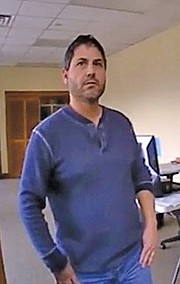AG joins FCC in tackling robocalls
SANDPOINT — Idaho has joined the crusade in tackling a growing global problem.
Attorney General Lawrence D. Wasden announced Tuesday that Idaho will be joining the likes of 22 other states and the Federal Communications Commission in tackling robocalls — an issue that has become more disruptive with each passing year.
Robocalls are automated phone calls where a dialing software calls the recipient, and upon answering, a pre-recorded message is played.
Automated phone calls are not illegal according to Idaho code. In fact, there are many convenient and efficient uses for robocalls, such as confirming an appointment, alerting travelers to changes in itinerary, or receiving in-real-time alerts from your bank in the event of potential fraud.
However, for every useful robocall, there are likely hundreds or thousands of others that do not contribute to society, these are more specifically referred to as spoof calls.
In spoof calls, those making the call disguises their true identity, location, and contact information with the intent of defrauding the recipient.
The national Truth in Caller ID Act prohibits manipulating caller ID information with the intent to defraud, cause harm, or wrongfully obtain anything of value.
In 2021, approximately 50.5 billion robocalls were made in the United States, 49.7 million of which were calls to Idaho phone numbers, according to information from YouMail Inc., an online outlet that catalogs and reports on robocalling.
According to data compiled by YouMail, the impact on Idahoans has gotten noticeably worse in the last month. There were approximately 18,255,500 calls made in March 2022, that’s three million more when compared to the 15.7 million calls made in February. The issue has garnered the attention of many national and international organizations who wish to put an end to the practice, the most recent addition being the support of the Idaho AG’s office on Tuesday.
“The agreement between state robocall investigators and the FCC’s Enforcement Bureau will help establish ways to share important information and increase collaboration and cooperation to more effectively investigate robocalls,” said the office on Tuesday.
FCC Chairwoman Jessica Rosenworcel expressed optimism for the endeavor.
“The FCC and these state leaders share a common enemy: robocall scammers targeting consumers and businesses around the country,” Rosenworcel said. “My team’s commitment to protecting consumers fits hand-in-glove with state Attorneys Generals’ ongoing efforts to combat these scams. We share a goal – to protect consumers – and with these agreements, we can also share the tools needed to achieve it.”
Individual Idahoans can help in the investigation by reporting robocalls to the AGs’s office. The AG’s office has an online portal where people can report at ag.idaho.gov/office-resources/online-forms/.
Although many entities find a way around Do No Call lists, it remains a common method people use to reduce the amount of unwanted calls they receive.
Those interested can register with the Federal Trade Commission’s Do Not Call registry at telemarketing.DoNotCall.gov.
For those interested in generating robocalls, Idaho law requires callers register with the AG’s Consumer Protection Division first. The application can be found on the AG’s website at ag.idaho.gov/consumer-protection/telephone-solicitors/, and must be physically mailed to the office.
A former Sandpoint resident was fined $12,910,000 in January 2020 for generating robocalls with the intent of spreading hate speech in Bonner County.
The FCC fined Scott D. Rhodes for leaving CDs with racist material on vehicles in the Sandpoint Highschool parking lot.
FCC officials say they identified “a widespread campaign” with six identified campaigns that they said violate the Truth in Caller ID Act, linked to Rhodes.
In addition to the CDs left at SHS, Rhodes was implicated in the distribution of flyers, emails, and robocalls targeting Sandpoint Mayor Shelby Rognstad, local media, and other community members. Many of the flyers and robocalls featured an anti-immigrant, racist message and sought to promote the area as a supposed haven for white supremacy.
The FCC, Federal Trade Commission, and local law enforcement all received numerous complaints from consumers about the calls.
“Our Notice of Apparent Liability will not undo the harm caused by these spoofed robocalls,” FCC Chairman Ajit Pai said in 2020. “But it once again makes clear this commission’s determination to go after those who are unlawfully bombarding the American people with spoofed robocalls.”
FCC officials said Rhodes was apparently motivated by a belief that the robocalls would result in media notoriety and boost publicity for his website and himself. Rhodes made hundreds of calls to other states such as California, Florida, Georgia, and Virginia.
The most well-known helpful tips for reducing the impact of robocalls include — hanging up as soon as you realize you’re on a robocall, and not answering calls from unfamiliar phone numbers.



